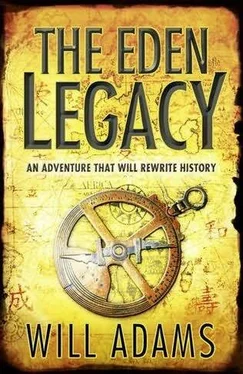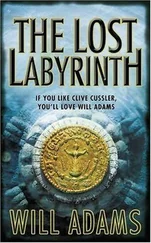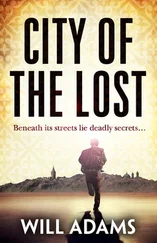Will Adams - The Eden Legacy
Здесь есть возможность читать онлайн «Will Adams - The Eden Legacy» — ознакомительный отрывок электронной книги совершенно бесплатно, а после прочтения отрывка купить полную версию. В некоторых случаях можно слушать аудио, скачать через торрент в формате fb2 и присутствует краткое содержание. Жанр: Триллер, на английском языке. Описание произведения, (предисловие) а так же отзывы посетителей доступны на портале библиотеки ЛибКат.
- Название:The Eden Legacy
- Автор:
- Жанр:
- Год:неизвестен
- ISBN:нет данных
- Рейтинг книги:5 / 5. Голосов: 1
-
Избранное:Добавить в избранное
- Отзывы:
-
Ваша оценка:
- 100
- 1
- 2
- 3
- 4
- 5
The Eden Legacy: краткое содержание, описание и аннотация
Предлагаем к чтению аннотацию, описание, краткое содержание или предисловие (зависит от того, что написал сам автор книги «The Eden Legacy»). Если вы не нашли необходимую информацию о книге — напишите в комментариях, мы постараемся отыскать её.
The Eden Legacy — читать онлайн ознакомительный отрывок
Ниже представлен текст книги, разбитый по страницам. Система сохранения места последней прочитанной страницы, позволяет с удобством читать онлайн бесплатно книгу «The Eden Legacy», без необходимости каждый раз заново искать на чём Вы остановились. Поставьте закладку, и сможете в любой момент перейти на страницу, на которой закончили чтение.
Интервал:
Закладка:
III
Knox arrived back at the pirogue still brooding on the man in the black shirt. There’d been something familiar and unsettling about him. But then Lucia arrived, and the activity of departure pushed it from his mind. They all dragged the boat down to the sea’s edge, stowed their luggage and helped Lucia to her place. Then Knox, Alphonse and Thierry pushed the pirogue out through the gentle breakers and vaulted aboard.
Thierry took the stern, from where he could steer. Alphonse sat sideways in the bow, where he raised the mast and set the sail, before furling it back up. Knox and Lucia each sat on one of the thin central slats. There was so little wind that Thierry and Alphonse grabbed a paddle each, went to work. Knox found a third paddle for himself. It was chiselled from heavy wood, but he soon picked up the rhythm, their blades banging like heartbeats against the pirogue’s hull.
He glanced back at the shore. The man in the black shirt was walking along the beach, almost as though keeping pace with them. After Mikhail’s death, Knox had lived in constant fear that some lowlife would learn his identity and that he had a five million euro bounty on his head. But the years had passed without incident, and he’d come to think himself safe. He remembered suddenly the nearness of the man in the alley, the flicker of frustration upon his face, and his old fear returned with such force that he half-missed his next stroke, splashing seawater into Thierry’s midriff. He turned to apologise and sort himself out, and by the time he looked again towards the shore, the man in the black shirt had vanished.
TWELVE
I
The road north from Tulear was even worse than Rebecca remembered. It was just about acceptable for the first twenty kilometres or so, but then it disintegrated into a track of sand, rock and rutted mud that eventually petered out into nothing a little north of Eden. Even making allowances for its wretched state, however, Zanahary drove like a flustered nun, inching across the occasional hazards like they were unexploded ordnance. It grew too much for Rebecca to bear. ‘Let me drive,’ she said.
Zanahary shook his head. ‘Insurance,’ he said.
‘Then let’s at least take a break,’ she said. ‘I need to stretch my legs.’
He pulled over gladly, reaching for his cigarettes even as he threw open his door. She waited till he was out then slid across into his seat, locked the door from the inside, turned on the ignition and pulled away. There were tears in his eyes when she slowed enough for him to catch up and clamber in the passenger side. He stamped on invisible brakes as she sped away along the track, twisting in his seat and muffling shrieks. Perversely, his fear only made Rebecca all the more rash. She came too fast upon an archipelago of rocks, hit one hard with her front right, bounced clear into the air. She cursed out loud; that was an axle gone for sure. It was a nightmare breaking down on these roads; you could wait forever for another vehicle. But somehow they landed between two hummocks and then bounded on to safe, soft sand. It was a dreadful, reckless piece of driving; it braced her and made her careful. But on Zanahary it had the opposite effect. ‘You drive like my brother,’ he said, as though fear was now pointless. ‘He mad too.’
There were cassette tapes on the dashboard. She pushed one into the player. The percussive Malagasy music took her back years. She turned the volume up, nodded to its beat. The wheel felt good in her hand, the driving position gratifyingly high. Navigating these tracks was all about anticipation, about trusting your hands and feet. The forest fell away to their left to reveal the sea, tall wading birds prowling the shallows, sea-grasses painting dark patterns in it, like God’s handwriting. The cassette finished. Silence embraced them. Huge butterflies drifted like perfume across her windscreen. A crested coua fled down the track ahead, swerving aside at the last possible moment. The track bumped and wound through settlement after settlement. Fitsitika. Fiserenamasay. Tsifota. Tsiandamba. The tiny hamlets of her childhood had grown up into villages of thatch huts and tin roofs held down by fifty-kilo sacks of rice refilled with leaking sand.
‘What that song?’
Rebecca glanced sideways at Zanahary. ‘How do you mean?’
‘That song you sing. What song?’
‘I wasn’t singing,’ Rebecca told him, for she couldn’t remember the last time she’d sung in anyone else’s presence. Yet now that he’d mentioned it, she could hear one of her mother’s old lullabies echoing in her mind, and it left her feeling a little uncertain of herself, so she took another cassette from the dashboard, and put it in to play.
II
Knox was beginning to feel blisters on his palms when the first gust of wind shivered the water and then it arrived in force. They all smiled relief at each other as they put down their paddles. The two piroguiers adjusted the rigging and unfurled their sail, and soon they were skimming so fast across the water that Alphonse had to step out on to the outrigger to give them extra stability. His sense of balance was extraordinary, standing on a narrow block of wood as water splashed off his feet like a water-skier, while Thierry clamped a paddle beneath his arm and used it as a rudder, working the rigging with his feet.
Knox opened a bottle of water and a pack of biscuits, offered them around. Lucia arranged her baggage along the bottom of the pirogue to form a makeshift deckchair on which she’d now stretched out and began to snooze, despite the two sides of the hull creaking loudly against each other. Knox devised a similar arrangement for himself, then sat low in the pirogue and watched landmarks grow large and then recede. Ahead were some fishermen, their nets trailing out behind them, sailing in a tightening spiral, like the whorls of a seashell, before beating the water with their paddles to startle fish into their trap. Gulls hung in the air above, and far away to his right, he could just make out the black crescents of a pod of dolphins at play.
Knox took his box-file of Eden project notes from his case, settled it in his lap, began going through them. As long as people had sailed out of sight of land and home, they’d striven for ways to calculate their position. For short distances, a combination of landmarks and directions sufficed: sail one day east to such-and-such an island, then south for a day to your destination. But this was inefficient and of little use to anyone swept off course by storms or unhelpful winds. What was needed was a way to determine position at sea without reference to land.
It was the great Alexandrian Eratosthenes who’d originally devised the concept of latitude and longitude. Latitude drew parallel bands upon the earth, like the equator and the tropics. Longitude, by contrast, divided the globe into segments, like an orange. Latitude was easy enough to calculate, even in open seas, by measuring the sun’s position at its zenith, then checking the result against a table of the sun’s declination for that day. But longitude proved a beast. In theory, it was easy enough: all you needed was to know the time relative to some fixed point, and you could work everything out from there. But keeping sufficiently accurate and reliable time on board ship was an immense challenge. It wasn’t just the rolling motion of the ship that had to be overcome, it was changes in air pressure and the corrosiveness of sea-air too. Most of all, a shipboard clock would somehow have to counter the changes in temperature that shrank or expanded the internal workings of clocks, rendering them inaccurate.
Europe began growing rich on new empires. But as trade boomed, so did shipping losses. A solution was needed urgently. The British instituted a Board of Longitude; the French a Royal Academy. Astronomers looked to the skies for inspiration, trying to use the moons of Jupiter as a universal clock. But in the end it was the obsessive inventor John Harrison who made the breakthrough, designing a bimetallic strip to cope with temperature variations, then crafting timepieces of such precision that one lost a mere five seconds on its maiden test run to Jamaica.
Читать дальшеИнтервал:
Закладка:
Похожие книги на «The Eden Legacy»
Представляем Вашему вниманию похожие книги на «The Eden Legacy» списком для выбора. Мы отобрали схожую по названию и смыслу литературу в надежде предоставить читателям больше вариантов отыскать новые, интересные, ещё непрочитанные произведения.
Обсуждение, отзывы о книге «The Eden Legacy» и просто собственные мнения читателей. Оставьте ваши комментарии, напишите, что Вы думаете о произведении, его смысле или главных героях. Укажите что конкретно понравилось, а что нет, и почему Вы так считаете.












